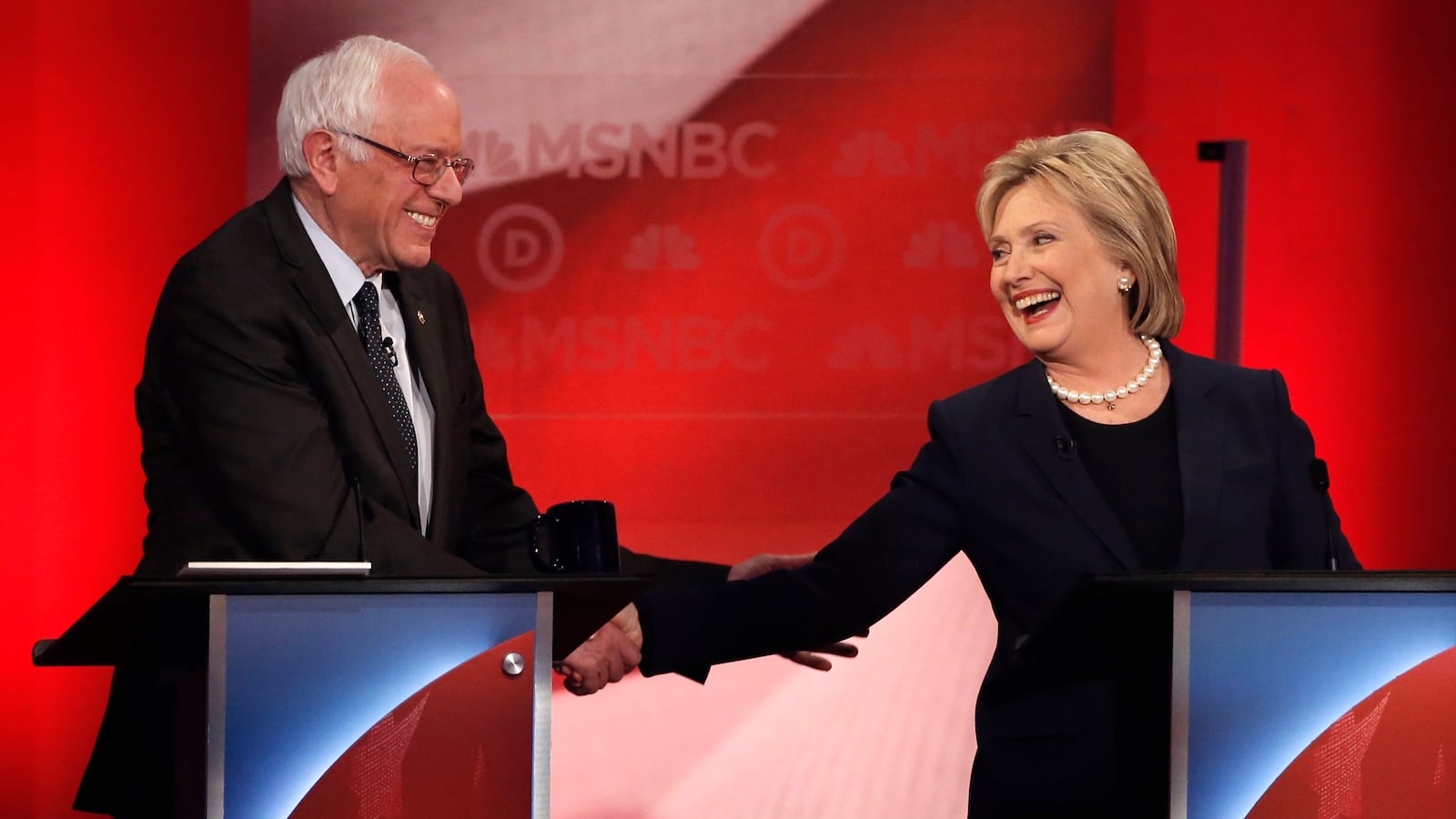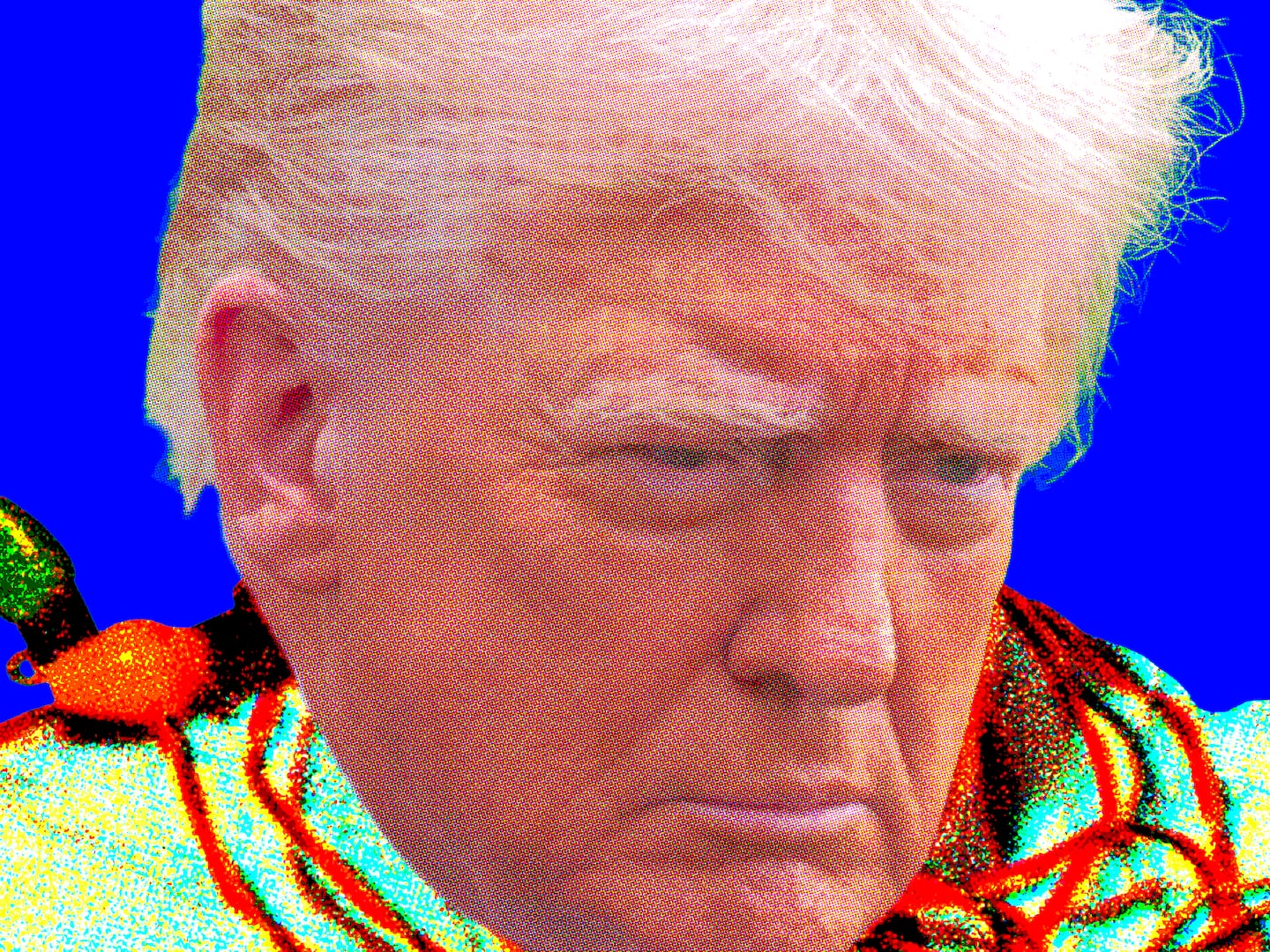Well, that was great. That was one of the best debates I’ve ever watched. The questions were (mostly) good and tough and not stupid, and Chuck Todd and Rachel Maddow did a really good job of steering it without getting in the way. Both candidates were good. Very good. There were a few tough moments, a few tender moments. It was real. I don’t know if it changed the dynamic in New Hampshire, but it did suggest one possible path for Hillary Clinton to narrow Bernie Sanders’s huge lead so that we might see some drama next Tuesday after all.
The debate had three sections. Section One, about the first 50 minutes, was on the economy, the special interests, the 1 percent, and what’s a progressive. That was fought on Sanders’s terrain, and any debate fought on Candidate A’s terrain is hard for Candidate B to win. Sanders was good. He made his points very well.
Clinton had her moments. As I write this they’re talking a lot on TV about her use of the phrase “artful smear,” referring to the Sanders camp’s suggestion that Clinton was bought and paid for because of her speaking fees and contributions from Wall Street. That was the one moment when the crowd went “ooooh.”
And then she said to Sanders, basically, I challenge you to name one matter on which I changed a position because of any contributions I took. He punted on that—he went into generalizations about the evils of big money, but he had nothing to say about Clinton herself. At the same time, she failed to point that out! She should have said hey, I notice you’re railing against the system, but you’re not saying a word about me. So she missed that opportunity for a huge applause line.
Part two was the foreign policy section, which took about half an hour. Here, frankly, Sanders looked out of his depth. Todd asked him what he’d do to draw down in Afghanistan. He talked about Iraq, ISIS, every place in the world except Afghanistan. It came across almost as if he didn’t know what was happening there. Clinton didn’t exactly blow him out of the water to the extent she might have, but she very clearly showed that she knows what’s going on out there in the big bad world and he does not. Twitter, during that half-hour, was full of people saying OMG, Bernie is in disaster land here.
The third segment, which lasted about 40 minutes, was the Everything Else segment, which included Flint, her emails, the death penalty, a few other matters. This was interesting, because the debate went from highly combative in Section One to merely combative in Section Two to kind of a kumbayah situation in Section Three.
On the emails, Clinton said she hadn’t the remotest worry that it was going to debilitate her candidacy. Sanders said he would not attack Clinton on it. Maddow asked Sanders an interesting question about electability, comparing him to Barry Goldwater in 1964 and George McGovern in 1972. Sanders had a pretty good answer, that he’s talking about core economic issues that those two were not, and Clinton didn’t press the case of Sanders’s un-electability nearly as aggressively as one might have expected. Flint came up; Clinton took the lead, and Sanders agreed. On the death penalty, they did disagree, with Clinton saying she still supported it for certain exceptionally heinous crimes, citing Tim McVeigh. Sanders said he was against it, but he didn’t try to whack Clinton for her position.
Sanders knows what to say; he knows how to connect emotionally. On Flint, he was done with his answer, and then it occurred to him, but let me just add—Flint is a poor black city, and it never would have been treated this way if it were a middle-class white city. Applause! Clinton is less good at that. She aims for the head. He aims for the heart. That’s their DNA. Heart almost always wins.
But here’s Clinton’s possible opening. Sanders’s foreign policy problems were real. He had no chops beyond saying I voted against Iraq. So Clinton can get at him on that. But: She should not make it a foreign policy argument explicitly. If she goes out there Friday and says “Senator Sanders isn’t prepared to deal with our complex world,” it’ll fall flat, because most Democratic primary voters don’t care about our complex world one-tenth as much as they care about evil banks and Wall Street.
However, they do care, being good liberals, about basic competence and levels of knowledge. So she needs to disguise her foreign policy argument (because most people feel kind of intimidated about foreign policy) as a ready-to-be-president argument. Because ready-to-be-president is code for Sanders’s lack of knowledge about foreign policy, but other things as well: the fact that he hasn’t ever had to take on the right in the way she has, the fact that he’s never been through the media grist mill in the way she has, and so on. It’s not an electability argument. It’s different. It’s about who can handle the job. Foreign policy is the avenue into it.
That’s the way she can tighten this New Hampshire race, I think. I don’t really think she can, because Sanders is very good at what he does, and this is just his state. But hey, let this go on: This is good. This is a conversation. This is democracy.






